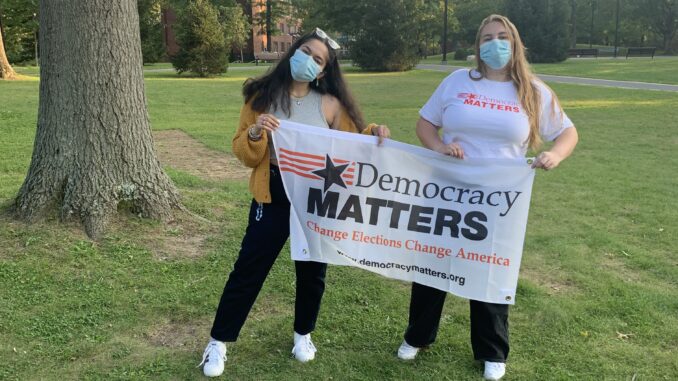
The impact of students on our democracy is immeasurable, but when it comes to getting involved with politics, many students don’t know where to start.
That’s part of the reason why national, non-partisan organization Democracy Matters was founded. Established in 2001 by NBA player, poet and activist Adonal Foyle, Democracy Matters works to get students involved in protecting our democracy with a special focus on voting rights, registering new voters and getting big money out of politics.
20 years later, the organization has chapters at over 300 universities and high schools across the nation.
Up until recently, this included a chapter at SUNY New Paltz. But like many campus clubs, the organization faded out during the pandemic and was not recharted in the past semester.
But now that students are back on campus, plans are in the works to finally bring Democracy Matters back too. Chapters of Democracy Matters at universities are usually established by student interns through the organization’s Campus Leaders Program. This year, the Campus Leader at New Paltz is fourth-year economics and political science major Melaina Ness.
The reestablishment of Democracy Matters on our campus comes at an essential time, as youth voter turnout has been especially low in recent elections.
During the 2016 presidential election, the youth turnout rate was 41% and in 2018: just a little over 30% according to the Democracy Matter’s website. The youth voter turnout rate did jump to 50% in 2020 but 18-24 year olds are still less likely to head to the polls than any other age group in the U.S.
Much of this may be because many students do not know where to begin when it comes to voting or becoming informed.
“I think political organizing and getting people really interested can be tricky because it feels far-fetched,” Ness explained, “The idea [with Democracy Matters] is to get everyone politically motivated and as active in our political process as early as possible so that it just becomes a habit. Otherwise, it seems out of reach.”
“The power students have is unlimited, but they can exercise it best by joining together in organizations like Democracy Matters,” said Joan Mandle, Executive Director of Democracy Matters.
Mandle works with chapters on college campuses and high schools, part of Ness’ internship is to stay in communication with Mandle including attending weekly check-ins.
Mandle explains that by joining Democracy Matters, students can “understand their own power and learn to use it effectively.”
The organization informs students about the issues threatening our democracy and encourages them to speak out and organize against them.
“Elected officials hear it when students who are registered to vote speak up,” Mandle explained.
Democracy Matters works to register students to vote, inform students about voter suppression and big money in politics and the way these issues connect to important policies on climate change, gun violence, college costs and more.
The Democracy Matters website outlines some of the ways in which these issues play out:
Voter suppression includes requiring identification at the polls, including proof of citizenship documents such as a passport or birth certificate which many individuals don’t always have around. It also includes a lack of language translations, closures of polling places (mainly in communities of color) and unnecessary voter registration restrictions.
If you, like many college students, changed your address before this past presidential election, you may remember scrambling to meet the deadline to change your voter registration. That’s because in New York State, voters must be registered about a month before the election. This discourages many individuals from even trying.
As for big money in politics — politicians are often led to respond to the concerns of wealthy donors rather than to voters. Money from big oil and gas companies causes legislators to ignore the need to protect our planet. The influence of banks and college-loan companies cause policies for affordable higher education to be put on the back burner.
Before Democracy Matters’ pandemic-caused hiatus, the organization held a multitude of events to help students fight these issues. The club helped register students to vote, worked with environmental clubs on campus and even had Alexandria Ocasio-Cortez speak at the school in 2018.
This semester, Ness hopes to register more students to vote, host events on Constitution Day and National Voter Registration Day, hold documentary screenings and discussions and really build a good foundation for the club moving forward.
“We’re fresh out of the gate so getting a bunch of people into leadership positions and just getting everyone really involved and excited about Democracy Matters [is a primary focus for this semester],” Ness said.
Democracy Matters hosts meetings every Wednesday at 6 p.m. rotating between in-person and online. In-person meetings take place on Parker Quad.
Join Democracy Matters this Wednesday, Sept. 15 at 6 p.m. The club will be making posters for Friday, Sept. 17 which is National Day of Action for the For The People Act and John Lewis Voting Rights Advancement Act which both expand voting rights and the removal of big money in politics.
The organization will be assembling and advocating for these bills on campus and in town by carrying around the posters and handing out information for how people can call their local officials and demand the bills get passed.
For more information about Democracy Matters on campus, follow the Instagram @democracymattersnp. For more information about Democracy Matters as a whole, email Joan Mandle at joanm@democracymatters.org.
Get involved and make your voice heard. “Democracy is not a spectator sport,” affirms Mandle, “students have the untapped power to make a difference.”
